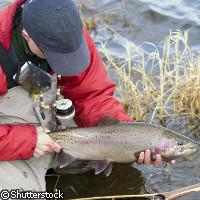LIFECYCLE project targets competitive, sustainable fish farming
Fish farming has been playing a significant role in the EU fisheries sector for the last two decades, and key actors are determined to sustain its production. The EU-funded LIFECYCLE ('Building a biological knowledge-base on fish lifecycles for competitive, sustainable European aquaculture') project is targeting the development of a knowledge-base on fish lifecycles for competitive, sustainable European aquaculture through a combination of question-problem driven approaches. LIFECYCLE is funded under the Seventh Framework Programme (FP7) to the tune of EUR 6 million. Coordinated by the University of Gothenburg in Sweden, LIFECYCLE is focusing on early development events, growth and environmental adaptation throughout the lifecycle, as well as on the physiology and immunology of life-stage transitions, such as smoltification and metamorphosis. The allocation of EU funds will help improve the competitiveness of the European fish farming industry. The project team, which is being led by Professor Thrandur Björnsson from the University's Department of Zoology, is combining latest physiological research with functional genomics to help build on the current knowledge of the mechanisms controlling the biological functions in fish. By enhancing knowledge, researchers and industry players will get a better grip on the situation, and be able to solve any problems that emerge. The partners said potential problems include disruption during larval development, and growth and adaptations to the environment. 'In this project we will be primarily conducting research on the four most important farmed species in Europe, Atlantic salmon, rainbow trout, sea bream and European sea bass, but also on species such as cod and halibut,' explained Professor Björnsson. The 14-member consortium will use and combine extensive resources and biological information about the cultured species to enhance the research. Under the project, the researchers will assess the changes in physiological systems at various points during the lifecycle of the species. This will be done to help them establish how early factors affect the later stages of the species' lives. According to the partners, they will also conduct cross-cutting experiments targeting the integration and crosstalk between physiological systems. Ultimately, this study will help direct research to the existing bottlenecks affecting production. Latest data show that Europe is highly dependent on fish imports. The fact that local sea fish quotas have been reduced substantially and that fish stocks have collapsed have wreaked havoc on the fishing industry. The researchers believe that increasing fish imports could trigger a drop in the consumption level, primarily due to higher prices and lower supply. This problem then affects the well-being of consumers. And everyone is aware of the health benefits of eating fish. The use of fish stocks in other parts of the world leads to over-exploitation and compels multinational fisheries companies to dislodge local fishing industries, the researchers said, adding that long-haul transport may be heightened by imports, which may have a detrimental effect on quality control.



